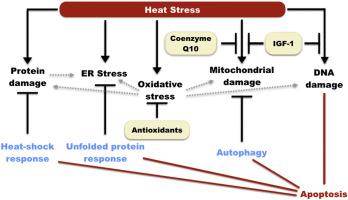当前位置:
X-MOL 学术
›
Theriogenology
›
论文详情
Our official English website, www.x-mol.net, welcomes your
feedback! (Note: you will need to create a separate account there.)
Thermoprotective molecules to improve oocyte competence under elevated temperature
Theriogenology ( IF 2.4 ) Pub Date : 2020-10-01 , DOI: 10.1016/j.theriogenology.2020.06.017 Marcelo T Moura 1 , Fabíola F Paula-Lopes 1
Theriogenology ( IF 2.4 ) Pub Date : 2020-10-01 , DOI: 10.1016/j.theriogenology.2020.06.017 Marcelo T Moura 1 , Fabíola F Paula-Lopes 1
Affiliation

|
Heat stress is an environmental factor that challenges livestock by disturbing animal homeostasis. Despite the broad detrimental effects of heat stress on reproductive function, the germline and the early preimplantation embryo are particularly prone. There is extensive evidence that elevated temperature reduces oocyte developmental competence through a series of cellular and molecular damages. Further research revealed that the oocyte respond to stress by activating cellular mechanisms such as heat shock response, unfolded protein response and autophagy to improve survival under heat shock. Such knowledge paved the way for the identification of thermoprotective molecules that alleviate heat-induced oocyte oxidative stress, organelle damage, and apoptosis. Therefore, this review depicts the deleterious effects of heat shock on oocyte developmental competence, heat-induced cellular and molecular changes, outlines pro-survival cellular mechanisms and explores thermoprotective molecules to improve oocyte competence.
中文翻译:

在高温下提高卵母细胞能力的热保护分子
热应激是一种环境因素,通过扰乱动物体内平衡来挑战牲畜。尽管热应激对生殖功能有广泛的不利影响,但生殖系和早期植入前胚胎尤其容易发生。有大量证据表明,升高的温度会通过一系列细胞和分子损伤降低卵母细胞的发育能力。进一步的研究表明,卵母细胞通过激活热休克反应、未折叠蛋白反应和自噬等细胞机制来应对压力,以提高热休克下的存活率。这些知识为鉴定减轻热诱导的卵母细胞氧化应激、细胞器损伤和细胞凋亡的热保护分子铺平了道路。所以,
更新日期:2020-10-01
中文翻译:

在高温下提高卵母细胞能力的热保护分子
热应激是一种环境因素,通过扰乱动物体内平衡来挑战牲畜。尽管热应激对生殖功能有广泛的不利影响,但生殖系和早期植入前胚胎尤其容易发生。有大量证据表明,升高的温度会通过一系列细胞和分子损伤降低卵母细胞的发育能力。进一步的研究表明,卵母细胞通过激活热休克反应、未折叠蛋白反应和自噬等细胞机制来应对压力,以提高热休克下的存活率。这些知识为鉴定减轻热诱导的卵母细胞氧化应激、细胞器损伤和细胞凋亡的热保护分子铺平了道路。所以,











































 京公网安备 11010802027423号
京公网安备 11010802027423号